How Does Adderall Help Narcolepsy? A Comprehensive Guide
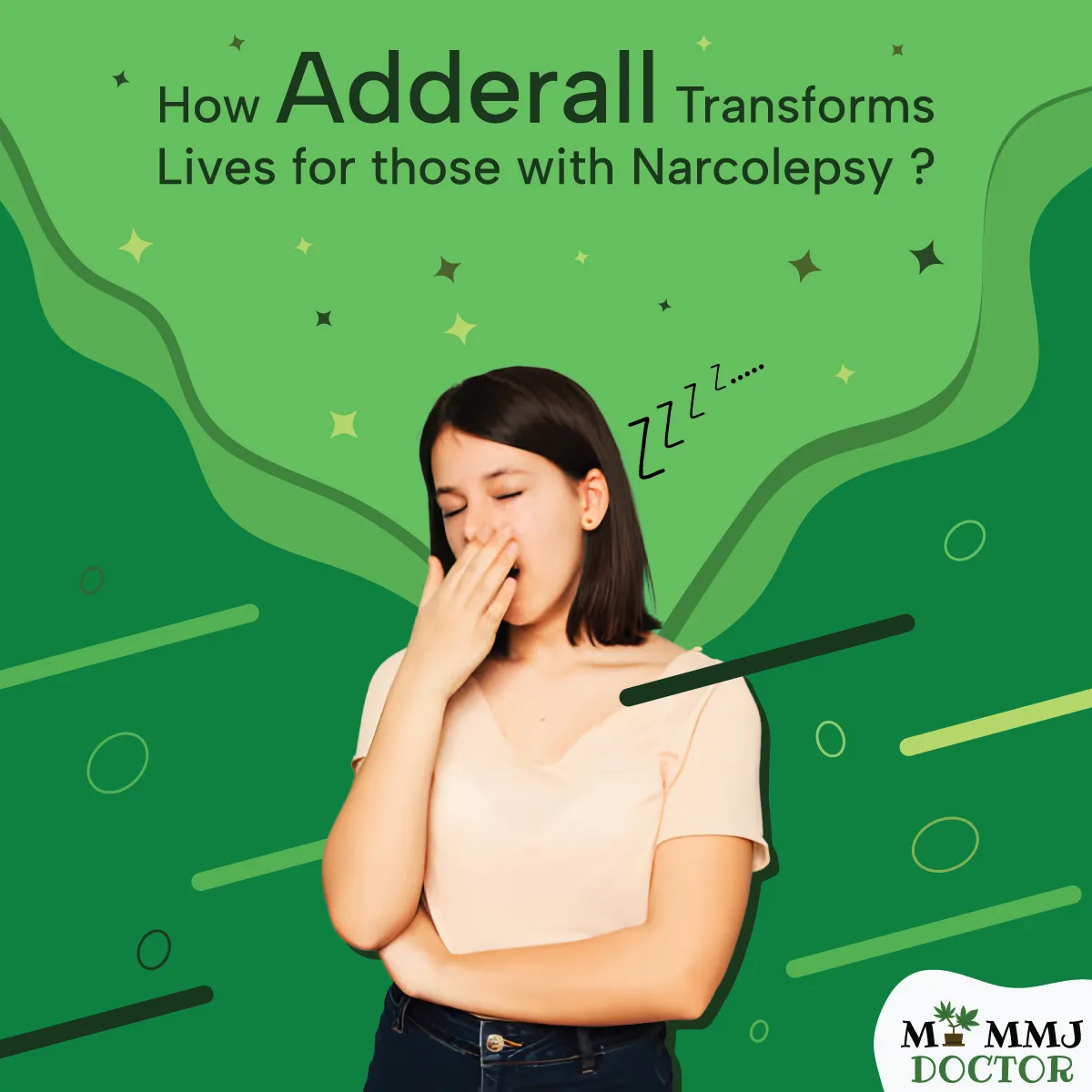
Narcolepsy makes daily tasks challenging due to sudden sleepiness and fatigue. While there is no cure for this sleep disorder, medications like Adderall, which is also best known for treating ADHD, have proven to be highly effective in managing narcolepsy symptoms. Adderall works by stimulating the brain, helping people with narcolepsy stay awake, focused, and productive throughout the day. In this article, we’ll explore how Adderall helps improve wakefulness, reduce sleep attacks, and enhance cognitive function for those dealing with narcolepsy.
What is Narcolepsy?
In some cases, narcolepsy leads to a sudden loss of muscle control, known as cataplexy. This can happen when someone experiences strong emotions, particularly laughter. There are two types of narcolepsy:
- Type 1, which usually includes cataplexy, and
- Type 2, which does not.
Narcolepsy is a lifelong condition with no cure, but medications and lifestyle changes can help manage the symptoms. Support from family, friends, and coworkers is also valuable for those affected.
Narcolepsy Symptoms:-
Symptoms may worsen in the first few years and then persist throughout life:
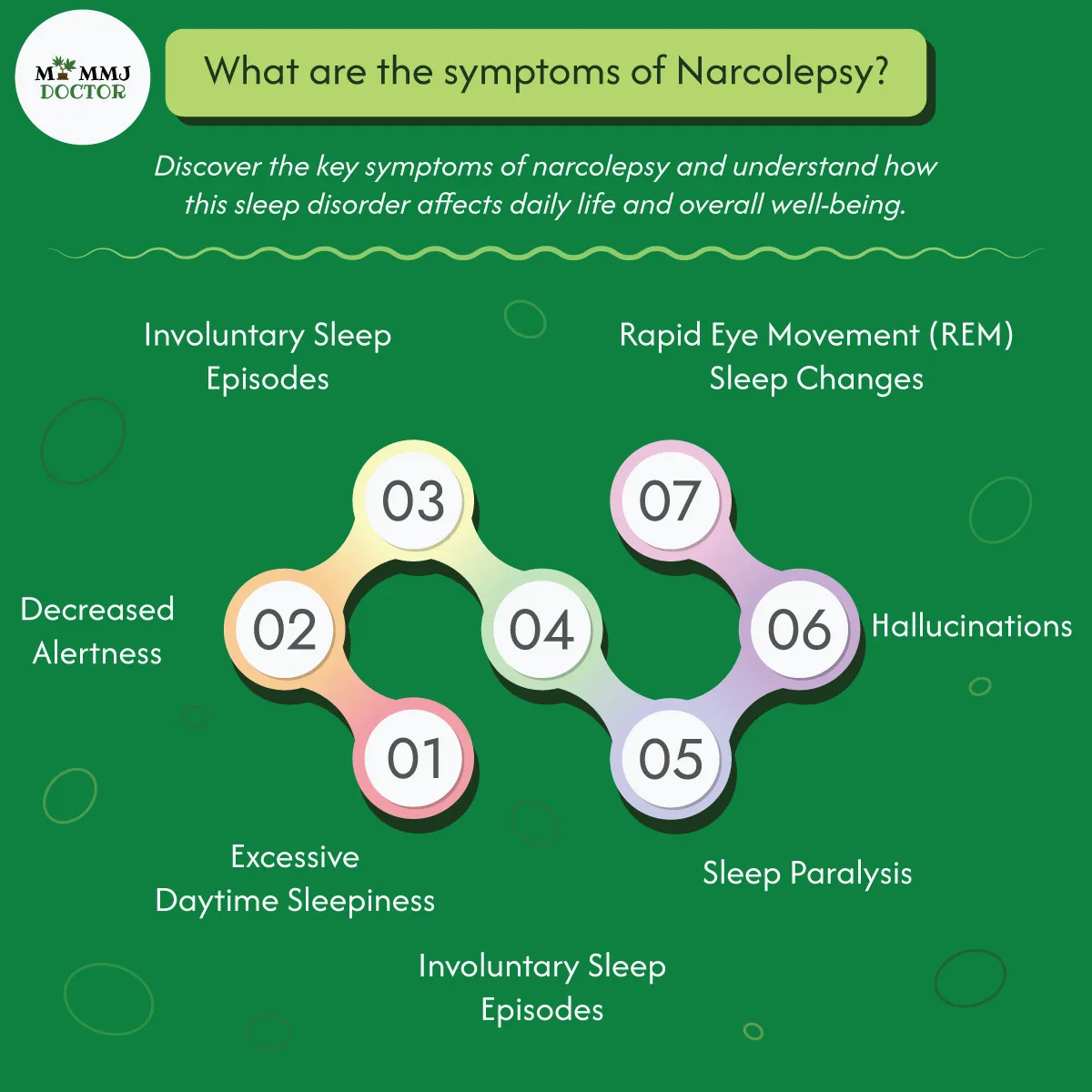
- Excessive Daytime Sleepiness
- Decreased Alertness
- Involuntary Sleep Episodes
- Cataplexy
- Sleep Paralysis
- Hallucinations
- Rapid Eye Movement (REM) Sleep Changes
- Excessive Daytime Sleepiness: People with narcolepsy can fall asleep unexpectedly at any time, whether during a boring task or socializing. This can be dangerous, especially while driving. Naps may last from a few minutes to half an hour, leaving individuals feeling refreshed but quickly drowsy again.
- Decreased Alertness: Many experience difficulty focusing and functioning due to daytime sleepiness, which is often the first symptom.
Involuntary Sleep Episodes: Some individuals might continue tasks while briefly asleep, like writing or typing, but they often don’t remember what they did afterward.
- Cataplexy: This sudden loss of muscle control can cause slurred speech or weakness. It lasts a few minutes and is triggered by strong emotions, often positive ones like laughter. In some cases, people may experience cataplexy only once or twice a year, while others have multiple episodes daily.
- Sleep Paralysis: Many with narcolepsy experience sleep paralysis, where they can’t move or speak while falling asleep or waking up. This lasts a few seconds to minutes and can be frightening.
- Hallucinations: Some may see things that aren’t there during sleep paralysis or while falling asleep (hypnagogic hallucinations) or waking up (hypnopompic hallucinations). These vivid experiences can be scary and might feel real.
- Rapid Eye Movement (REM) Sleep Changes: People with narcolepsy often enter REM sleep much faster than usual, typically within 15 minutes instead of the normal 60 to 90 minutes.
How Adderall Can Help With Narcolepsy?
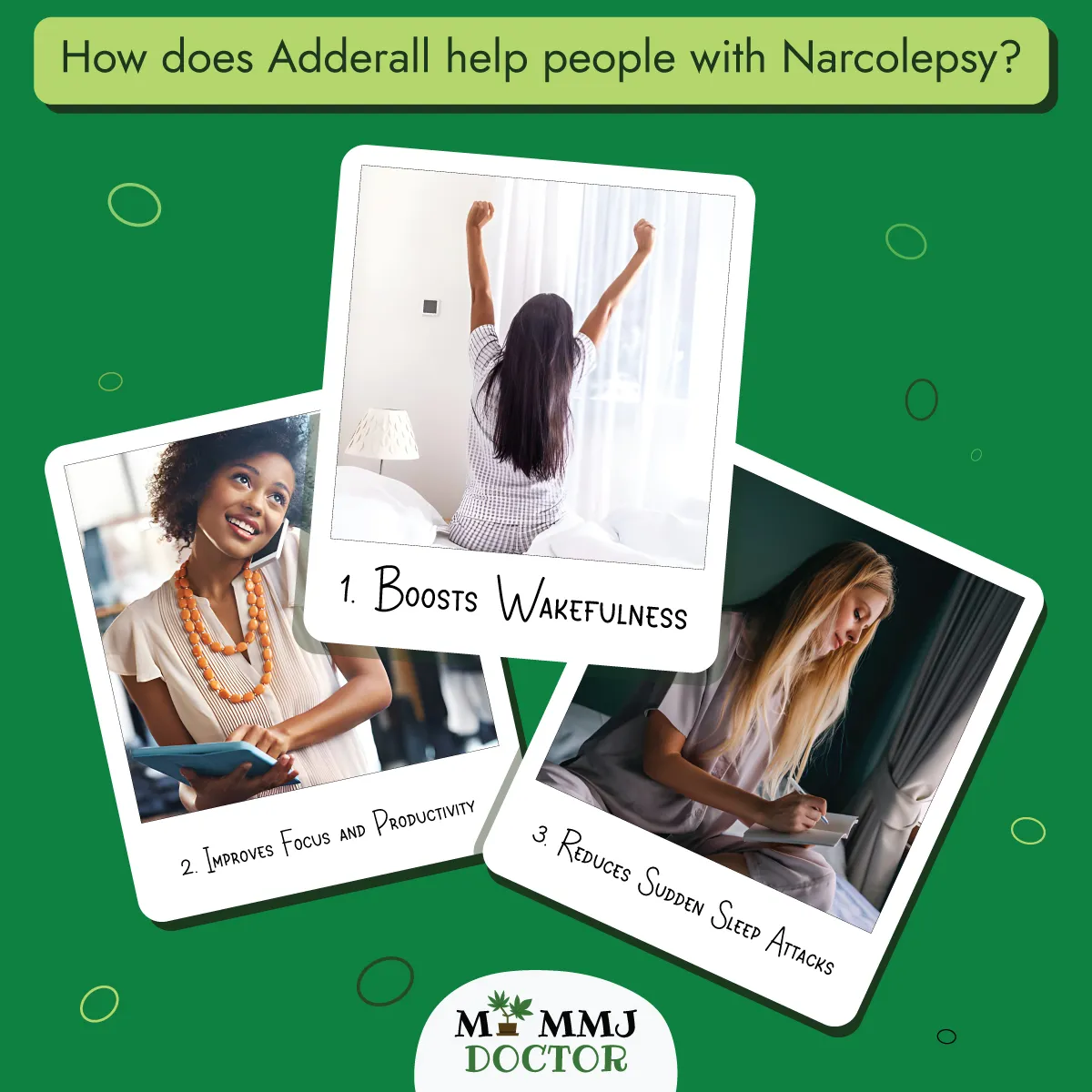
- Boosts Wakefulness
Adderall increases chemicals in the brain like dopamine (which helps with motivation and attention) and norepinephrine (which keeps you awake and alert). This helps people with narcolepsy stay awake for longer periods and improves their overall quality of life. - Improves Focus and Productivity
People with narcolepsy often struggle with concentration due to constant drowsiness. Adderall helps improve focus and productivity, making it easier to stay on task at work or school. - Reduces Sudden Sleep Attacks
Narcolepsy can cause unexpected sleep episodes during the day. Adderall’s stimulating effect reduces these attacks by keeping the brain more alert.
How Does Adderall Work Chemically in Narcolepsy?
Mechanism of Action
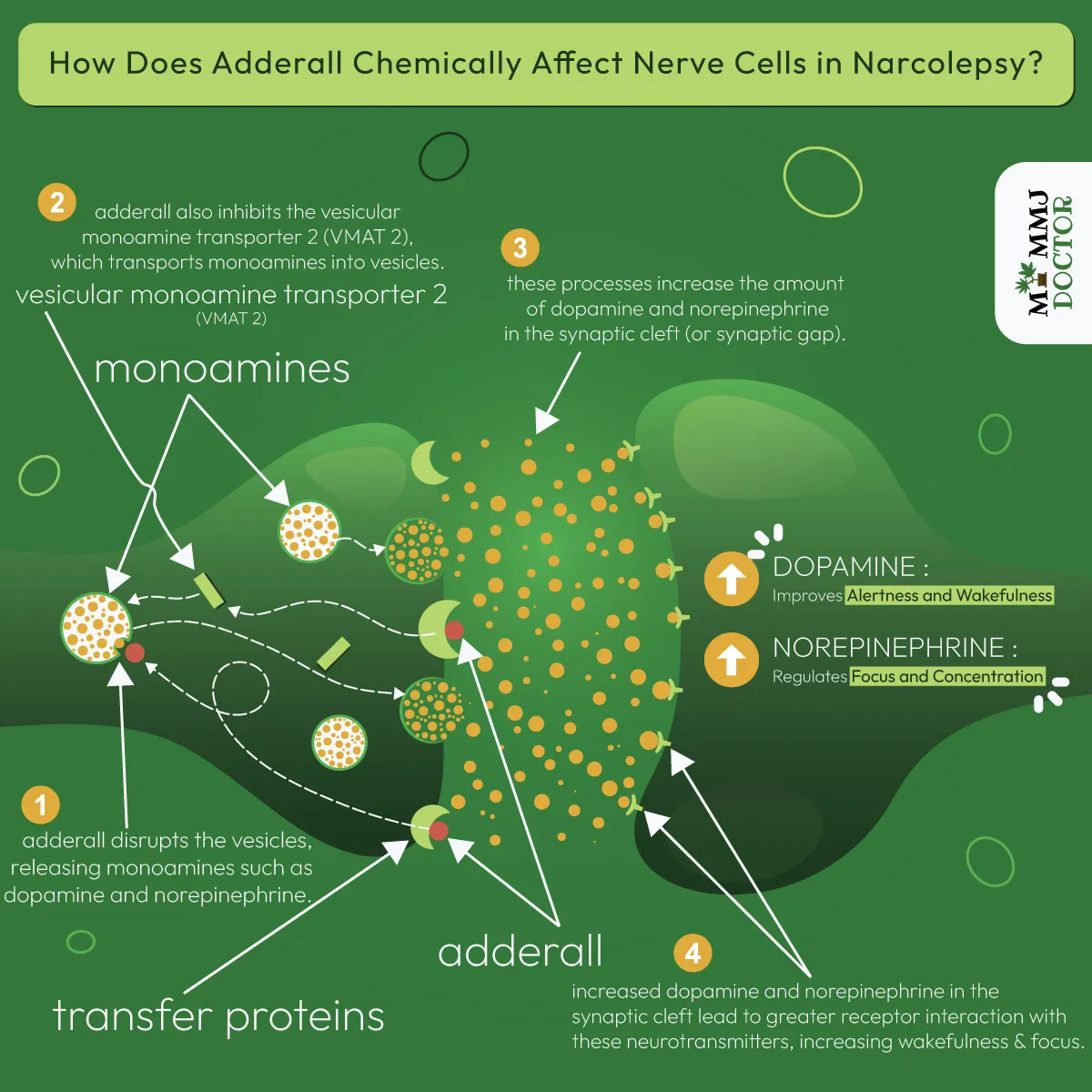
Step 1: Releasing Key Brain Chemicals
Medications for narcolepsy break open small storage areas (vesicles) in brain cells, releasing important chemicals like dopamine and norepinephrine. These chemicals help control mood, attention, and movement, improving focus and mood.
Step 2: Blocking the VMAT-2 Protein
These medications also block a protein called VMAT-2, which usually stores dopamine and norepinephrine in brain cells. By blocking this protein, the drugs keep more of these chemicals available in the brain.
Step 3: Increasing Chemical Levels Between Brain Cells
With disrupted storage and blocked VMAT-2, more dopamine and norepinephrine are released into the gap between brain cells, improving communication and enhancing focus, mood, and attention—key issues for people with narcolepsy.
Step 4: Boosting Focus and Attention
The increased levels of dopamine and norepinephrine help the brain function better, improving attention, focus, and mood, which is essential for managing narcolepsy symptoms like excessive daytime sleepiness.
Studies Supporting Adderall for Narcolepsy
- Study on Amphetamines and Sleep Disorders:
Research published in the Journal of Clinical Sleep Medicine evaluated the efficacy of amphetamine salts, including Adderall, for sleep disorders like narcolepsy. The study found that these stimulants significantly improved wakefulness and reduced daytime sleep episodes. - Clinical Review on Stimulant Medications for Narcolepsy:
A comprehensive review in Neuropsychiatric Disease and Treatment highlighted that stimulant medications, such as Adderall, are first-line treatments for narcolepsy due to their effectiveness in promoting wakefulness. The review also discussed how these medications improve the quality of life in patients suffering from narcolepsy.
Note:- Amphetamines and Adderall are closely connected because Adderall is a prescription medication that contains amphetamines as its active ingredients.
What is the right dosage for Adderall in Narcolepsy?
Adderall Dosage:
For treating narcolepsy, the typical Adderall dosage ranges from 5 to 60 mg per day, divided into one to three doses.
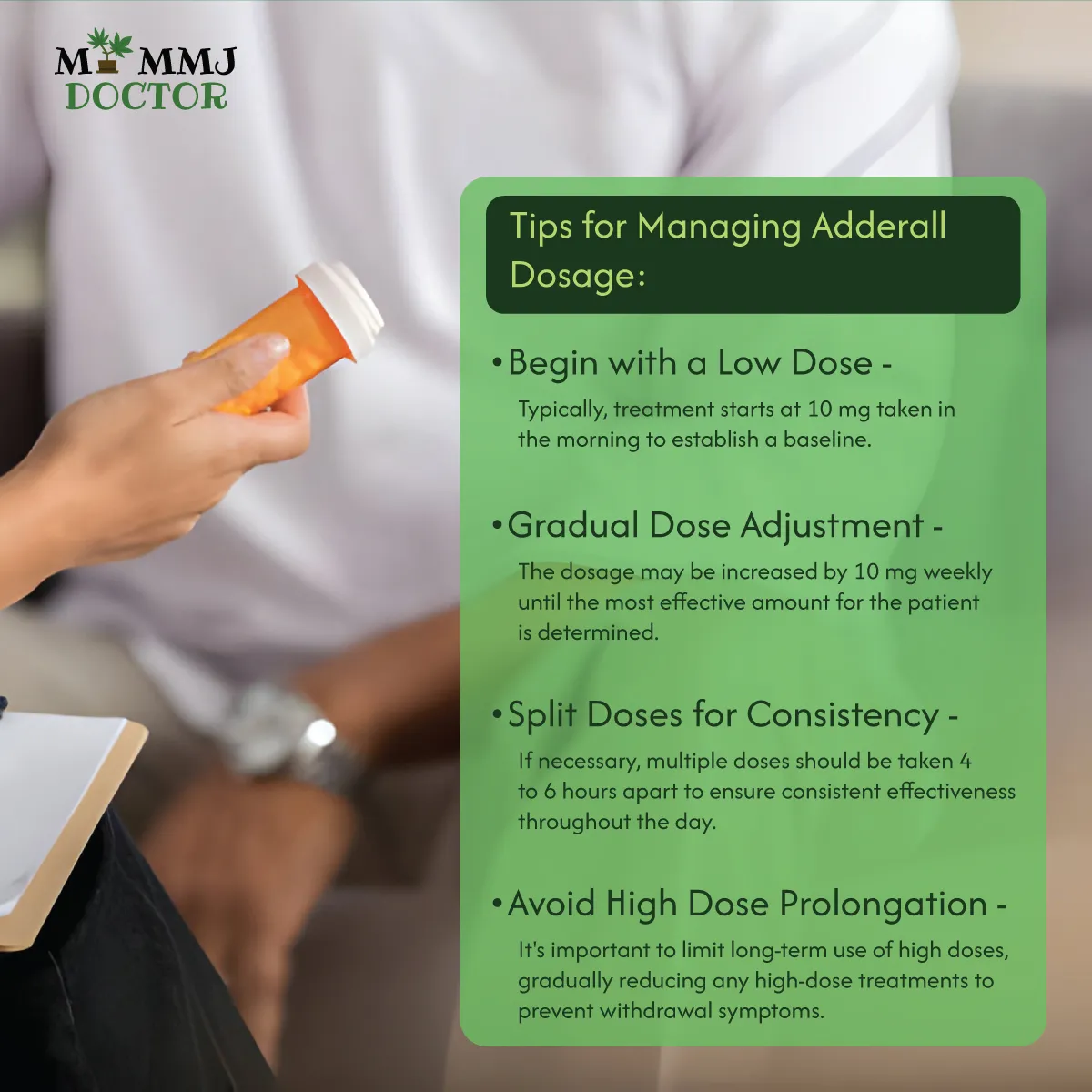
Adderall Administration:
- Start low: Usually, treatment begins with 10 mg in the morning.
- Increase gradually: The dose can be increased by 10 mg each week until the best amount for the patient is found.
- Dividing doses: If multiple doses are needed, they should be spaced out 4 to 6 hours apart to maintain effectiveness throughout the day.
- Limit high doses: Long-term use of high doses should be avoided, and any high-dose treatments should be gradually reduced rather than stopped suddenly to prevent withdrawal effects.
How Can My MMJ Doctor Help You Get Adderall for Narcolepsy?
Ready to get started? Here’s how to book your consultation:
- Fill Out Our Medical Intake Form: Start by completing a simple form to share your health information with us.
- Book an Online Consultation: You can schedule a video appointment with a healthcare provider through My MMJ Doctor. They will check your health and, if needed, prescribe you Adderall for narcolepsy.
- Pick Up from Local Dispensary: After you get your prescription, you can buy your Adderall at a local dispensary.
Conclusion
Living with narcolepsy can be tough, but Adderall helps by keeping people awake and focused. It increases chemicals like dopamine and norepinephrine in the brain, which helps control sudden sleep attacks and improves daily functioning. Whether it’s staying alert, focusing better, or being more productive, Adderall offers important support. However, it’s important to find the right dose and be aware of any possible side effects for safe use.
FAQs
- What is Adderall?
Adderall is a medication used to treat ADHD and narcolepsy. It helps improve focus and alertness by increasing certain chemicals in the brain.
- When is Adderall Used for Narcolepsy?
Adderall is used for narcolepsy to help reduce daytime sleepiness and sudden sleep attacks. It’s prescribed when someone struggles to stay awake during the day, even after a good night’s sleep. Doctors may include Adderall in a treatment plan to enhance daily activities and overall quality of life.
- What is the best treatment for narcolepsy?
The best treatment for narcolepsy often includes stimulant medications like Adderall, which help reduce excessive daytime sleepiness and improve focus. Other options may include sodium oxybate and certain antidepressants, depending on individual symptoms and needs. A combination of medication and lifestyle changes, such as good sleep hygiene, is typically recommended for effective management.
- What to Consider Before Starting Adderall?
Before starting Adderall, tell your doctor about any health issues, especially heart problems, high blood pressure, or mental health conditions. List all the medications you’re currently taking to prevent interactions. Begin with a low dose and follow your doctor’s instructions for changes. Be aware of potential side effects like a fast heart rate, trouble sleeping, or anxiety.
- What are the side effects of Adderall?
Some common side effects of Adderall include a fast heart rate, trouble sleeping, dry mouth, anxiety, and headaches. It’s important to talk to a doctor about these side effects
- How does Adderall improve focus?
Adderall increases certain chemicals in the brain that help with attention and motivation. This makes it easier for people to concentrate on tasks.
Related Articles
What Are the Side Effects of Adderall?
What Are the Side Effects of Adderall to Know Before Starting and After Withdrawing?Adderall, a prescription medication combining dextroamphetamine and amphetamine, is commonly used to treat attention deficit hyperactivity disorder (ADHD) and...
Everything You Should Know About Adderall XR
Everything You Should Know About Adderall XRAdderall XR has become a key treatment option for managing ADHD and narcolepsy, offering long-lasting relief from symptoms like inattention, hyperactivity, and excessive daytime sleepiness. For...
How Adderall Helps You Treat ADHD ?
How Adderall Helps You Treat ADHD ?Adderall is a highly effective medication for individuals with ADHD, offering life-changing benefits by helping them manage their symptoms and improve focus, organization, and overall well-being. As one of...



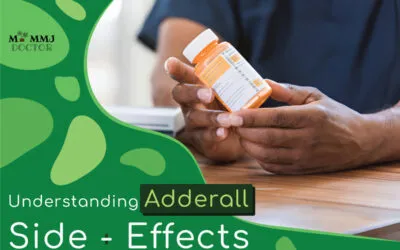

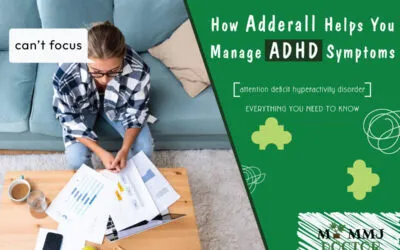
0 Comments